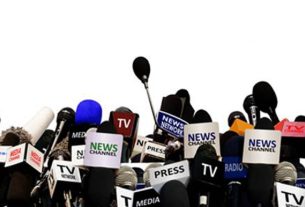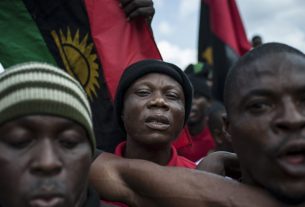The recent claim by President Muhammadu Buhari that his “high-impact” projects meet the yearnings and expectations of Nigerians is disturbing and subject to serious interrogation.
The claims by Mr. President, which were made at the opening of the Ministerial Performance Review Retreat of this administration in Abuja, indicated that the implementation of his nine-priority agenda had remarkably impacted sectors like power, communications, digital economy, oil and gas, national security, anti-graft war, social investment, health, and agriculture. To many Nigerians, this assertion appears laughable while to some others, it is not appropriate for the President to score himself highly.
It is the opinion of the generality of Nigerians that matters in determining the appropriate scorecard of the Buhari administration. It is not in the position of the student to give himself a passing mark or high score. It is the examiner who is adequately qualified to determine the scores whether high or low.
As the saying goes, the proof of the pudding is in the eating. It is even ironic that Aisha Buhari, the President’s wife in a recent interview with the British Broadcasting Corporation (BBC), acknowledged that President Buhari performed poorly in the past seven years when she apologised to Nigerians for the dismal performance of her husband’s administration.
A proper assessment of President Muhammadu Buhari’s claim would be necessary, for the sake of posterity, in order to put the issues in proper perspective and to guide the present generation of Nigerians on what good governance is and what it is not.
It is quite understandable that the Buhari administration in the twilight of its days in office would resort to some form of image laundering but that would amount to nothing as the views of the average Nigerian is already obvious in this regard. The assessment of the performance of the Buhari administration can be situated from two different perspectives.
First, to what extent did the administration fulfil its numerous promises to the Nigerian people? Second, what was the situation of Nigerian society in 2015 and what is the situation today? Are Nigerians better off after over seven years of the Buhari administration?
On the promises made by the administration in the 2014/2015 election campaign season, candidate Muhammadu Buhari, under the auspices of his party, the All Progressives Congress (APC), made numerous mouth-watering promises to the Nigerian people. These are clearly indicated in the Party’s Manifesto for the 2015 Presidential election.
The then President Goodluck Jonathan was tagged “clueless” by Buhari and his crowd. The promises made in the APC Manifesto were numerous cutting across a review of the constitution, restructuring, national security, conflict resolution, national unity and social harmony, job creation and the economy, agriculture and food security, industrialisation, infrastructure, oil and gas industry, education, healthcare, senior citizens, youth, sports and culture, women empowerment, environment and foreign policy. The administration performed woefully in all of them.
Some cursory look at the promises across the sectors includes the promise to “generate, transmit and distribute from current 5,000 – 6,000 MW to at least 20,000 MW of electricity within four years and increasing to 50,000 MW…” was not achieved.
Currently, power generation is still in the region of 5,000 MW or even lower and the collapse of the National Grid has become commonplace under the Buhari administration, after over seven years in office. The promise to “maintain sound macro-economic policy environment, run an efficient government and preserve the independence of the Central Bank was not achieved.
Under the Buhari administration, the fiscal authorities have resorted to unbridled borrowing from the Central Bank of Nigeria (CBN) in breach of the CBN Act (2007) through the Ways and Means advances above the 5% limit of the previous year’s revenue. These advances have skyrocketed to about N20 trillion as of mid-2022, which is an addition to the public debt. Currently, the administration is trying to securitise these outrageous borrowings from the CBN on long-dated instruments. The CBN has more or less become an appendage of the Presidency, to the detriment of the country’s economy.
Another promise to “make our economy one of the fastest growing emerging economies in the world with a real GDP growth averaging 10% annually” was a total failure. Under the watch of the Buhari administration, the Nigerian economy entered into two recessions.
The first recession of 2016, which is the second in the country’s history, took place over two decades after the first one of 1984, which incidentally took place under the watch of Major General Muhammadu Buhari. In 2016, the economy contracted by 1.6 % due to negative oil prices and oil production shocks, which spilt over to the non-oil sectors.
The recovery from the recession was not due to any brilliance by the administration but due to positive developments in the oil sector with some relief from increasing global oil prices. According to the National Bureau of Statistics (NBS), the 2016 economic recession was a full-year recession and the worst in the country’s history since 1987.
The second recession under President Buhari took place in 2020 as a result of the COVID-19 pandemic effects but the management of the economy displayed so much fiscal indiscipline with poorly managed social inclusion programmes that recovery from the recession took longer than expected.
The NBS data for the second quarter of 2022 GDP growth was a mere 3.54% and this was celebrated, a far cry from the average of 10% promised by the ruling party. Over the period, job losses have cut across every sector of the economy even in the agricultural sector where the invasion of farmlands by fearful and armed itinerant cattle herders has drastically impacted negatively crop production nationwide. And President Buhari has largely chosen to look the other way probably because these herdsmen are majorly his kinsmen.
The promise to create “6 new Regional Economic Development Agencies (REDAs) to act as champions of sub-regional competitiveness and put in place an N300 billion regional growth fund (average of N50 billion in each geo-political region) to be managed by the REDAs, encourage private sector enterprise and support to help places currently reliant on the public sector” have not been realised.
On education, the plan to attain up to 15% of the annual budget for this critical sector as well as make substantial investments in training quality teachers at all levels of the educational system was not realised. The proportion of the budget that went to education under the Buhari administration hovered between 5% and 7%. This is the same Muhammadu Buhari that criticised the Goodluck Jonathan administration in the handling of the strike by the Academic Staff Union of Universities (ASUU).
Since 2015, Buhari has failed to make any difference in the matter in which he had positioned himself as someone who had a magic wand to address the issue. For much of 2020 and 2022, the public universities were shut and hapless students from poor homes were left to their fate while officials of the administration sent their children and wards abroad.
The story goes on and on, in the health sector where young doctors, under the watch of the Buhari administration, are daily leaving the shores of Nigeria for greener pastures.
The President himself, contrary to his commitment in 2015 to receive medical care in Nigeria has made it a pastime to regularly fly off to London to attend to his health, at great public expense. He is presently in the UK for medical attention.
Looking at the three key areas to which the administration claims are its major focus, namely the economy, national security and fight against corruption, the story is not different when compared against what it met on ground in 2015. The performance figures are there in the public domain.
On the fight against corruption, available data indicates that the country is more corrupt now than in 2015. The Transparency International report on the Corruption Perception Index (CPI) showed that Nigeria plunged to 149th on the CPI in 2020, dropping 13 places since 2015. In the 2019 rating, Nigeria was ranked 146th out of the 180 countries surveyed, scoring 26 points out of a possible 100 while in 2021, the situation worsened again with Nigeria falling to 154th out of 180 countries in the CPI with 24 points out of 100. The evidences are very clear with numerous incidences of corruption in the public domain such as the looting by the Accountant-General of the Federation, the re-looting of recovered loot under a former EFCC Chairman and the increasing perennial oil theft under the watch of Mr. President who also doubles as the Minister of Petroleum. The summation is simply that corruption in the country has worsened under the Buhari administration. President Buhari has thus turned out to be a problem rather than the solution in the fight against corruption. What a sad story.
On the economy, President Buhari has turned out to be a massive failure. His major lamentation has been on the low price of crude oil in 2015 but it is also instructive that the average price of crude oil in the first year of the Olusegun Obasanjo administration in 1999 was about $15 per barrel, far lower than the $67 per barrel Buhari met in May 2015. Despite this, Obasanjo performed fairly and did not indulge in the unconscionable blame game Buhari has made a pastime, despite the reckless looting under the Abacha regime. President Buhari and members of his cabinet have never failed to continually blame the Goodluck Jonathan administration for every problem it is confronted with. This is a mark of gross irresponsibility. Though oil price subsequently fell to as low as $28 per barrel in January 2016, it has since taken an upward trend recording over $100 per barrel in recent times. Buhari met a public debt burden of about N12.50 trillion in 2015 but has pushed the figure to over N42 trillion in July 2022, through unbridled borrowing over the years. This is not accounting for the deficits of the 2022 budget as well as the N20 trillion Ways and Means advance from the CBN.
With the securitisation of these debts to the CBN, the total public debt would be in the region of N65 trillion or more. Under Buhari, Nigeria’s public debt has become unsustainable such that the entire revenue generation is not sufficient to service the debt. Other economic indicators are also not favourable. For example, the exchange rate, which was about N197 to a U.S. dollar when he took office, is now over N750 presently in the parallel market. The official rate of about N430 to a dollar is merely notional as most economic agents hardly access the dollar through that rate. The inflation rate, which was single digit in 2015, is now over 20% and still increasing. According to the Hanke’s Currency Watch List, the naira has been ranked “as the 11th worst-performing currency against the dollar in the list of 19 worst-performing currencies in the world. Naira ranked the fourth worst in Africa, ahead of the Ghana Cedi which ranked 13th globally and third in Africa.”
On the general economy, macroeconomic pressures have been rising according to the Moody’s Investors Service, which has “downgraded Nigeria’s local currency and foreign currency long-term issuer ratings as well as its foreign currency senior unsecured debt ratings to B3 from B2.” It also placed the country’s Gross Domestic Product (GDP) rating on review for downgrade. The report indicates that, “the rating downgrade is driven by the significant deterioration in Nigeria’s government finances as well as its external position, exerting increasing pressure on the sovereign credit profile despite a strong increase in international crude oil prices in 2022.” President Buhari literally destroyed the Nigerian economy and it would take a yeoman’s job for the incoming President in 2023 to make any significant difference in this regard.
On security, Nigeria has become a killing field under President Buhari. Prior to 2015, insecurity and Islamic terrorism, which was largely limited to the North East and some other parts of the North, has now spread to virtually every part of Nigeria. According to Amnesty International, armed groups and the security forces continued to commit crimes under international law and serious human rights violations in north-eastern Nigeria. This was worse under the Buhari administration. The ravaging effects of the Fulani herdsmen terrorising farmers across the various regions of the country as well as activities of bandits have had negative effects on road travellers and agricultural crop production. Sadly, the sanctity of life under the Buhari administration has been drastically diminished.
Nepotism has never been raised to a high level in Nigeria until Buhari came into office in 2015. Virtually every key position that matters in the country’s bureaucracy has been reserved to his Fulani kinsmen. Buhari even incurred foreign loans to invest in Niger Republic, a neighbouring country than invest in his own country, particularly in parts of Southern Nigeria. President Buhari has been a very divisive leader. His handling of the cases involving the Indigenous People of Biafra (IPOB) of Nnamdi Kanu and the Yoruba Nation of Sunday Adeyemo (Igboho) cases in relation to that of the bandits who are his kinsmen speaks loudly of double standards.
Nigeria does not need a leader like Muhammadu Buhari, not now nor in the future. Nigeria has never been as divided in its history as it is under President Buhari. He has taken the country many years backward. Whatever positives he managed to score in infrastructure development, such as roads and railway construction have paled into insignificance amidst palpable insecurity, social disequilibrium and the marooned economy. No amount of image laundering by his handlers can change the general public opinion that the performance of the President is negative. This cuts across even many of those who voted to bring him to power in 2015 and even in 2019. Many people are counting down on when Buhari will leave office and go into political oblivion. Indeed, President Muhammadu Buhari’s assessment of his performance in office is not generally accepted by many Nigerians. It is far from the truth, as the data indicates.
The Guardian





